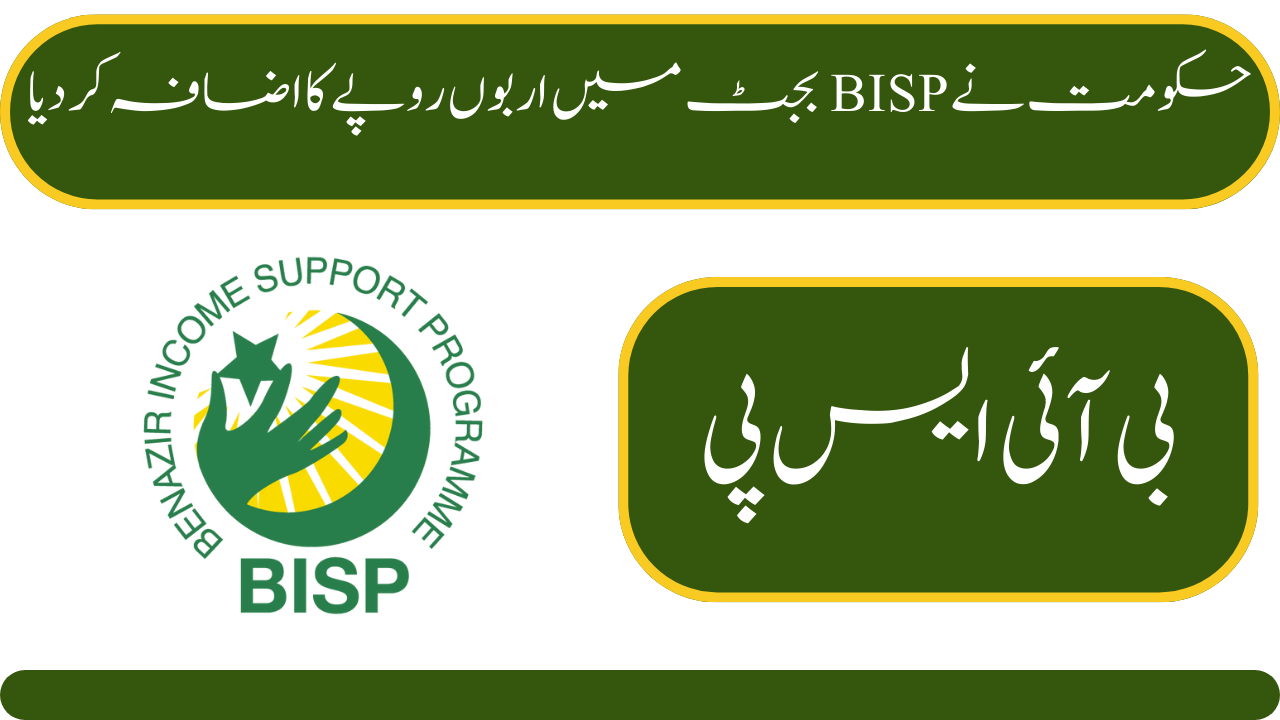BISP Budget
The Pakistani government has proposed a significant increase in the budget for the Benazir Income Support Programme BISP Budget, raising it to a record Rs593 billion for the next fiscal year. This move, coming after discussions with the International Monetary Fund (IMF), is aimed at mitigating the impact of rising inflation by increasing the number of beneficiaries and their compensation. But what does this really mean for Pakistan’s poorest families? Let’s dive in.
Benazir Income Support Programme (BISP)
The Benazir Income Support Programme (BISP) was launched in July 2008 with the primary goal of providing financial assistance to the underprivileged segments of society. Named after the late Prime Minister Benazir Bhutto, BISP Budget is Pakistan’s largest social safety net program. It aims to reduce poverty through unconditional cash transfers to the poorest households, enabling them to meet their basic needs.
The Proposed Budget Increase
The Pakistani government has proposed a substantial budget increase for BISP, raising it from Rs472 billion to a whopping Rs593 billion for the next fiscal year. This 26% hike is not just a number; it’s a lifeline for millions of families struggling to make ends meet amid rising inflation.
Impact on Beneficiaries
The proposed budget increase is expected to expand the number of beneficiaries from the current 9.3 million to approximately 9.6 to 9.7 million people. This expansion is critical as it aims to include more families who are in dire need of financial assistance.
Increase in Compensation
One of the most significant aspects of this proposal is the increase in quarterly compensation for the beneficiaries. Currently, families receive Rs10,500 every quarter. With the new budget, this amount is set to rise to approximately Rs13,000 per family. This increase is designed to help families cope with the ever-increasing cost of living.
Current Beneficiaries and Kafaalat Program
Under the BISP, the Kafaalat program provides monthly stipends to women from the poorest households. Currently, 9.3 million people benefit from this program, receiving financial support that helps them manage their daily expenses. The proposed budget aims to increase this number, ensuring more families get the help they need.
IMF’s Role and Recommendations
The IMF has played a significant role in the proposed budget increase for BISP Budget. Their recommendations have been crucial in shaping the new budget. The IMF suggested several key changes, including:
- Increasing Beneficiaries: To cushion the effects of inflation, the IMF recommended adding more families to the BISP program.
- Compensation Adjustment: Ensuring that compensation increases are aligned with inflation rates to maintain purchasing power.
- Electricity Subsidies: Restricting subsidies to BISP Budget beneficiaries and providing direct cash transfers instead of general subsidies.
- Health and Education: Improving outcomes through conditional cash transfer programs that focus on health and education.
Focus on Inflation Adjustment
Inflation is a major concern for any economy, and Pakistan is no exception. The IMF’s recommendation to adjust compensation in line with inflation is crucial. This adjustment ensures that the purchasing power of the beneficiaries is maintained, allowing them to afford essential goods and services despite rising prices.
Targeted Electricity Subsidies
The IMF suggested that electricity subsidies should be restricted to BISP Budget beneficiaries. Instead of general subsidies that benefit all, direct cash transfers to the poorest families ensure that the assistance reaches those who need it most. This targeted approach is more efficient and ensures that the funds are used effectively.
Health and Education Improvements
Improving health and education outcomes is a key goal of the BISP. The proposed budget includes conditional cash transfer programs that focus on these areas. For example, families might receive additional funds if their children attend school regularly or if they get regular health check-ups. These conditions encourage positive behaviors that can lead to better long-term outcomes.

Challenges and Criticisms
While the proposed budget increase is a positive step, it is not without challenges. Critics argue that the government needs to ensure that the funds are used efficiently and reach the intended beneficiaries. There are also concerns about the long-term sustainability of such a large budget allocation.
Government’s Response to Criticisms
The government has acknowledged these criticisms and has outlined plans to ensure effective implementation. This includes improving transparency and accountability mechanisms, as well as regularly monitoring the program to make necessary adjustments.
Long-term Goals of the BISP
The long-term goals of the BISP go beyond just providing immediate financial relief. The program aims to reduce poverty, improve health and education outcomes, and empower women. By achieving these goals, BISP hopes to create a more equitable and prosperous society.
Public and International Reactions
The proposed budget increase has received mixed reactions from the public. Many welcome the move, seeing it as a necessary step to support the poorest families. However, there are also concerns about the potential for mismanagement and corruption. Internationally, the increase has been viewed positively, with many seeing it as a sign of Pakistan’s commitment to improving social welfare.
Case Studies and Success Stories
Over the years, BISP has transformed the lives of many families. Take the example of Fatima, a widow with three children. Before receiving BISP support, Fatima struggled to feed her children. With the monthly stipend, she has been able to send her children to school and ensure they have enough to eat. Stories like Fatima’s highlight the positive impact of the program.
Conclusion
The proposed increase in the BISP budget to Rs593 billion is a significant step towards supporting Pakistan’s poorest families amid rising inflation. With the IMF’s recommendations, the government aims to enhance the effectiveness of the program, ensuring that more families receive adequate support and that compensation keeps pace with inflation. This move not only provides immediate relief but also aims to improve long-term outcomes in health and education for the most vulnerable segments of society.
FAQs
What is the BISP?
The Benazir Income Support Programme (BISP) is Pakistan’s largest social safety net program, aimed at providing financial assistance to the poorest households through unconditional cash transfers.
How many beneficiaries are there currently?
Currently, there are approximately 9.3 million beneficiaries under the BISP, specifically through the Kafaalat program.
What is the new compensation amount?
The quarterly compensation for BISP beneficiaries is set to increase from Rs10,500 to approximately Rs13,000 per family.
How does the IMF influence the BISP budget?
The IMF has recommended increasing the number of beneficiaries, adjusting compensation with inflation, restricting electricity subsidies to BISP beneficiaries, and improving health and education outcomes through conditional cash transfers.
What are the long-term goals of the BISP?
The long-term goals of BISP include reducing poverty, improving health and education outcomes, and empowering women to create a more equitable and prosperous society.
